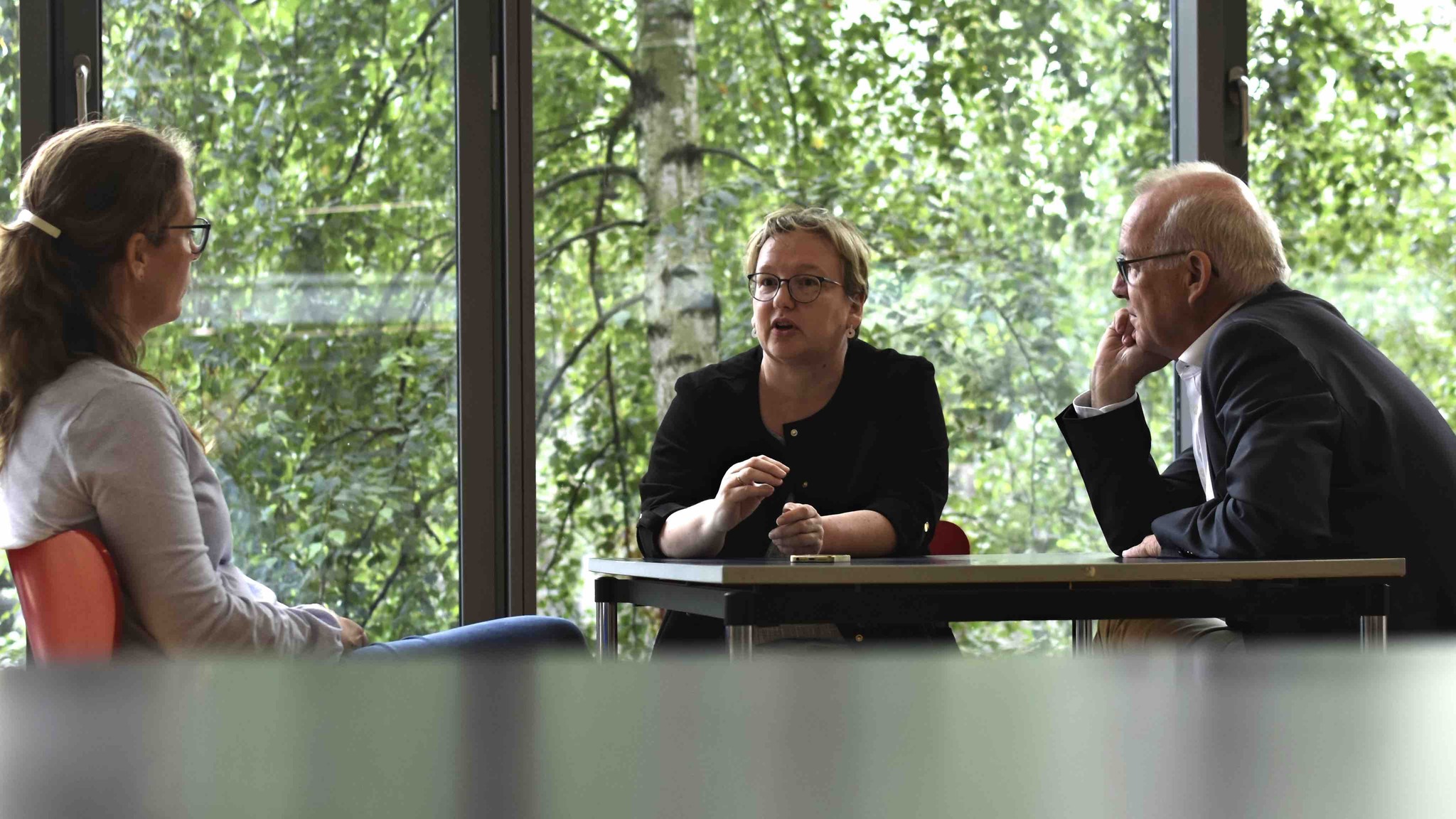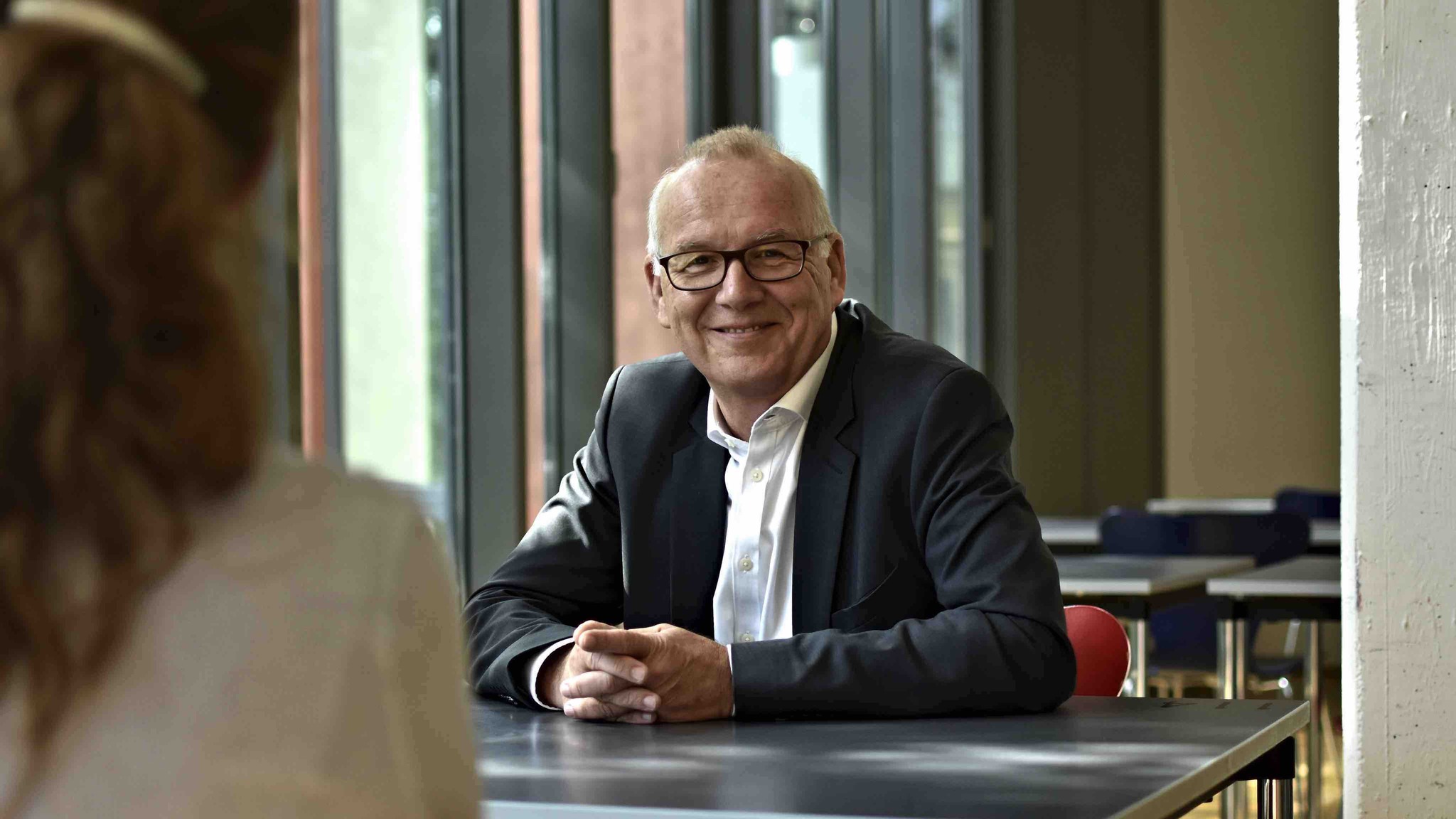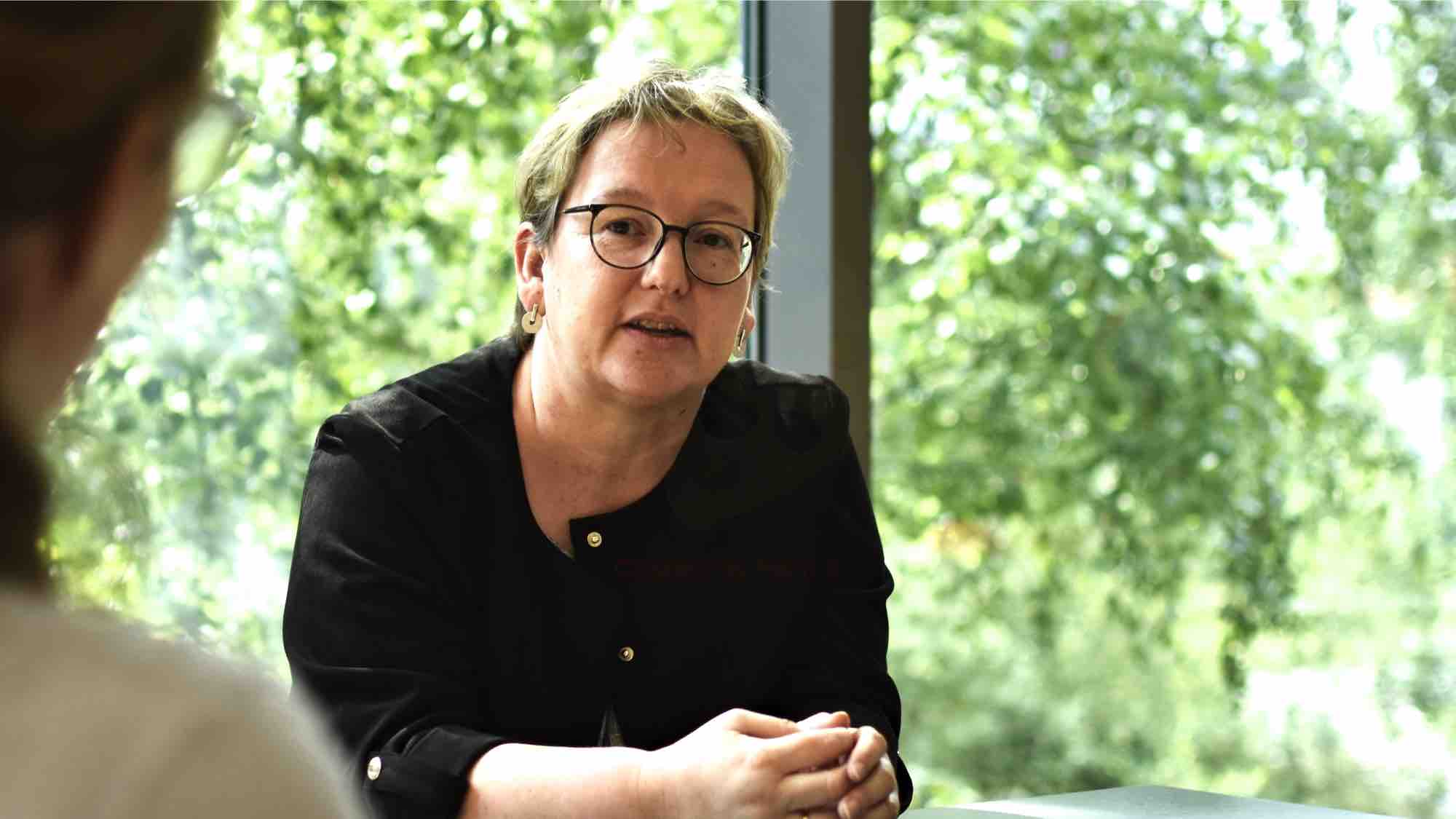
© Philipp Batelka
“Science Will Become Far More Important for Bremen”
What does President Professor Bernd Scholz-Reiter think about the University of Bremen? And how does Frauke Meyer as the new Director of Finance and Administration want to shape the university?
50 years of the University of Bremen – that is certainly an event that warrants an interview with the President and the new Director of Finance and Administration to talk about the present situation and future of the scientific institution. In this double interview, Professor Bernd Scholz-Reiter and Frauke Meyer talk about their personal views of the university, the location of Bremen, and how they imagine the university to be in the future. The interview was held in the Mensa cafeteria.
Mr. Scholz-Reiter, the university is now 50 years old and you shaped a good ten years of those 50 as President. Where does the university stand today? What makes it stand out?
Bernd Scholz-Reiter: The university is shaped by its history. What certainly makes us stand out is that we are cooperative and push matters forward together – often with a pioneering spirit. Maybe that is down to the reform idea of the 1970s when the university was founded.
Where does this become visible?
Bernd Scholz-Reiter: In the fact that we are developing new staff structures, for example. Let us think back to the senior lecture and senior researcher positions in the mid-level academic sector that offered permanent positions at an early stage in academic careers. Other states are copying them now. Some of our staff advise other states and universities, as they want to learn from our experience. Another example is the university’s early initiative in the frame of the European university alliances. We took part in the EU’s first round of bids and were among the first successful universities in 2019. We are now able to look back on nearly two years of work within the Young Universities for the Future of Europe alliance (YUFE), in which we are creating one of the first European Universities together with nine universities in Europe and four non-university partners. Thus, our internationalization really gained momentum in the past years. We definitely directed our focus on this path.

© Philipp Batelka
Why?
Bernd Scholz-Reiter: Firstly, due to the international visibility and the internationalization of academia in all disciplines. It used to be restricted and only focus on natural sciences and medicine. However, internationalization has greatly increased in the humanities and the liberal arts. The second reason is that we can profit internationally from a far larger pool of great students and researchers. That can only be enriching, as expertise is obviously increased globally in comparison to nationally. Another reason is the demographic development. It is well known that the number of potential students in Germany is decreasing. However, if we require the same number of graduates in order to organize our societal system in an expedient way, we need more international students at German universities who then stay in Germany and Europe after graduation. Another aspect plays a role for the European university alliance YUFE: We have seen that certain nationalist interests in certain communities in Europe are coming to the fore again, which is not in our interest. I especially mean right-wing, nationalist, anti-democratic tendencies. And that is why it is good if our university positions itself as a European university in order to strengthen the awareness of the European identity among the students by means of joint studying. That strengthens Europe and the European ideal.
Ms. Meyer, you have been Director of Finance and Administration of the university since January 2021. How do you want to shape the next years?
Frauke Meyer: We have a few big tasks ahead of us. One of them is internationalization. By far the biggest task at the moment is digitalization: It is all about changing processes, structures, and how we work together. That all needs to be accompanied intensely with staff development and organizational development measures.

© Philipp Batelka
What do you find particularly important?
Frauke Meyer: That we feel the “University of Bremen identity.” We know that we are not particularly well equipped by the state financially but we have a certain spirit, which will not, however, stay around by itself. It needs to be lived and felt. This spirit is important for us as a resource. All of our staff and students should have the feeling that ‘this is our university – we want to help create it.’ It is only in this way that we can be so successful despite our restricted means. It is the awareness that we are really fantastic because we’re doing it together with this special Bremen spirit that we need to maintain.
How is it possible to take this into consideration when organizing processes?
Frauke Meyer: By not becoming too bureaucratic but rather taking a good look at how we can get into a flow that makes all of our lives easier. One challenge will be to keep, further develop, and win over new staff. We know that there is a lack of trained staff and we must make use of everything that we, as the University of Bremen, have to offer.
What would that be in your opinion?
Frauke Meyer: I think that the factor that motivates us all is our special cooperation, which is what I can shape as the Director of Finance and Administration. The question is: How can we work together? In a trusting and cooperative way with each other. We cannot afford to strictly adhere to hierarchical processes. That does not work and is not enjoyable and it exactly that – enjoyment – that we need when working. Which is obviously sometimes difficult in day-to-day life. That is something that we have felt during the pandemic. Many people are exhausted and our staff resources are limited. In the first part of my term in office, I believe it to be an important task to ensure that we all get through the pandemic well and then continue afterwards with fresh energy. It will be hard work and it is what we are all focused on.
Internationalization and digitalization bring changes with them. Some people are scared of this.
Frauke Meyer: I avoid using the word “scared” in connection to work. I find it to be unsuitable; it’s not my choice of wording. I rather believe that we should act in a manner less centered on the problem and rather view the opportunities that we have and the chances available for creating something. Based on my working experience, that is one of the great things about the University of Bremen. Basically all positions have the chance to shape a great deal themselves. Recognizing this scope, using it responsibly, and aligning it with the university’s goals is important in my opinion. This also applies to internationalization. Some people may ask themselves how quickly we all need to have command of a foreign language in our positions. I feel we should all have the confidence that we will slowly get to grips with it. The example of YUFE: We will certainly not have 5,000 YUFE students here and send 5,000 of our students to the other nine YUFE locations from one day to the next. Not every one of us will have to communicate in nine different languages.
“Having confidence and trust in ourselves is what we need and should have, as we are doing well in many areas.” Director of Finance and Administration Frauke Meyer
I rather think that we will get to know it all step-by-step. Especially as we have many well-trained university staff already. Having confidence and trust in ourselves is what we need and should have, as we are doing well in many areas. I would also like to explicitly support what the President said: I find the European ideal to be extremely important. It affects us all. We should think in a European manner, stand up for European values, and live in co-existence.
What do you both particularly value about Bremen?
Bernd Scholz-Reiter: What we repeatedly hear from others is that we work well together. With that I mean the staff from different institutions – even across institute boundaries. One example is the U Bremen Research Alliance, made up of the university and twelve non-university research institutes in Bremen State, which are jointly supported by the government and states. The network has developed in such a way since its institutionalization in 2016 that we no longer are only able to use joint resources. We also move certain matters forward together. In this way, we are addressing and developing Bremen State’s high-profile areas in science and the innovation and technology focus points. One success is the German Research Foundation’s (DFG) National Research Data Infrastructure (NFDI). No other German state is quite as well set up in this regard as Bremen. The U Bremen Research Alliance plays a central role in this.
Frauke Meyer: The advantages in Bremen are, of course, that we have very short distances to all institutions with which we work – whether it be in science or politics. What I also always experience in a positive way is the support of the citizens. If I am somewhere and explain that I am there as a representative of the university, it seems to mean something to everyone. Many people studied here or know people who are doing a degree or work at the university. I have noticed that there is a great deal of support. We especially took note of it in last spring, when we stood up for the full funding of the Science Plan. I found it very impressive to see from how many different fields were received said support.
And finally, a question that looks to the future: What do you imagine the University of Bremen to be like in 50 years?
Bernd Scholz-Reiter: Naturally, this is dependent on all surrounding factors. How will our society develop? In which situation will our state system, Europe, and the world find themselves? However, if we take the last 50 years, which were peaceful in Germany and had a prospering state and societal structure, and project that into the future then I would say that the University of Bremen will be ever better positioned in 50 years. We will then mainly be an international research university that works on many important issues for society – topics that we are already aware of today. And we will also have hopefully solved several problems by then, for example in connection to global warming. We need to have control of that by that point in time. Our university is very competitive in terms of climate and environment research. With our regional and international partners, we will surely create important stepping stones in the coming years in order for us to overcome this crisis. Yet, it will surely also be the case that we will have new research questions, which are already becoming apparent today. I am thinking of space exploration as an example: It is to be assumed that the first people will be able to stay on planet Mars for an extended period of time. This will bring up new questions and thus also great scientific challenges and opportunities. Additionally, migration issues and changes in power relationships will also play a different role. Therefore, I ask: What will societal cohesion look like in 50 years?
That means that this will still play a key role in science at the University of Bremen in 50 years.
Bernd Scholz-Reiter: Exactly. Moreover, our vision of a European university should have become reality in 50 years. It is, after all, a decade-long process. Frauke Meyer already stated that we will develop in this direction slowly.
“In 50 years, we should be a YUFE university together with our European partners.” President Professor Bernd Scholz-Reiter
It will take one or two generations. However, we should have brought this vision to life in 50 years and should be a YUFE university together with our European partners.
An exciting thought. What do you think, Ms. Meyer?
Frauke Meyer: I think that the work of the University of Bremen will have changed in 50 years – provided that our world remains peaceful. If this is the case, we will work together internationally and nationally in an entirely different way. Less spatially based and more flexibly and agile. I do, however, also believe that our university will be more important for Bremen in 50 years than it is today. That science will become more significant for Bremen. One will immediately connect the university, science, and internationality with Bremen’s name if we continue to develop as we are. I am of the opinion that there will also be a different form of studying. That people will maybe return to the university more frequently in the sense of life-long learning. That is why we will then need to have a different structure available. And I am sure that the University of Bremen will still be one of the best places to work in Bremen in 50 years’ time.
Why?
Bernd Scholz-Reiter: Because the diversity of topics we deal with and how many different people meet and work here is interesting. I am very sure of that. Yet, I also think there will be changes that we cannot yet imagine.
Do you mean digitalization?
Bernd Scholz-Reiter: In part. What I believe is that further parts of Bremen will carry the university logo and we will be far more anchored in the city in 50 years.
Experience the University of Bremen in the city at CAMPUS CITY
On the occasion of its 50-year anniversary, the University of Bremen will be presenting itself to the city of Bremen from October 16 to 30. Lectures, tours, workshops, and talks will allow all those interested to dive into the world of academics and university.